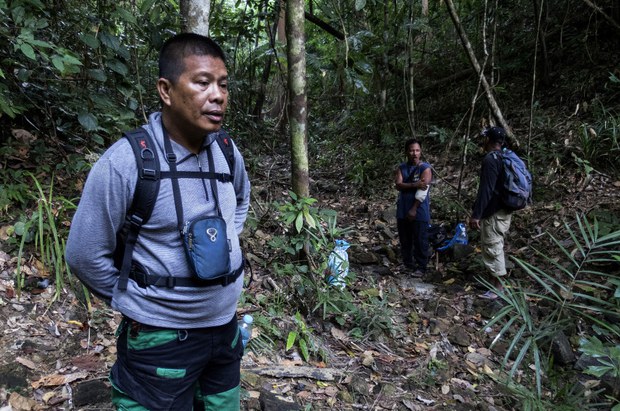48 Environmentalists Killed in Philippines Last Year, Global Witness Reports
2018.07.24
Cotabato, Philippines
 Ruben Arzaga, an environmental “para-enforcer” with the Palawan NGO Network Inc. (PPNI), stands in a forest on Palawan Island in the southern Philippines during a search for illegal loggers, Feb. 23, 2017. Later that year, Arzaga was shot and killed during a similar mission.
Ruben Arzaga, an environmental “para-enforcer” with the Palawan NGO Network Inc. (PPNI), stands in a forest on Palawan Island in the southern Philippines during a search for illegal loggers, Feb. 23, 2017. Later that year, Arzaga was shot and killed during a similar mission.
Forty-eight environmental activists were killed in the Philippines last year under the regime of President Rodrigo Duterte, a global human rights advocacy group reported Tuesday, saying the death toll was the highest it had ever documented in an Asian country.
Global Witness, a London-based NGO, said the killings targeted Filipinos who defended their land from destructive agriculture, including land-grabs by palm oil firms, among others.
“In yesterday’s presidential address, it was encouraging to hear President Duterte’s assurance to protect the environment,” Global Witness campaigner Ben Leather said.
“But his hard-hitting stance rings hollow without concrete measures to protect the activists and indigenous people who are on the frontline to protect the environment.”
Environmental activists in the Philippines were being killed “at an alarming rate” for speaking out against business interests, particularly against mining and agricultural firms, the research by Global Witness showed.
“His direct [call] for mining companies to act responsibly must be extended to the world of agribusiness – as almost half of all killings in the Philippines in 2017 were linked to this industry,” Leather said of the president.
“With more environmental and land activists killed last year than ever before, President Duterte must ensure their safety and put a stop to his violent rhetoric against those who defend their rights,” he added.
‘Repair what you have mismanaged’
Duterte, in his annual State of the Nation speech before Congress on Monday, did not mention any updates on the killings of land-rights and environmental activists, but he called for mining companies to extract minerals without damaging the environment.
“To the mining industry, I say this once again and maybe for the last time, do not destroy the environment or compromise our resources; repair what you have mismanaged,” Duterte said.
He vowed to implement “restrictive policies,” including a prohibition on open-pit mining, which was destroying the Southeast Asian country, he said, particularly the mineral-rich southern island of Mindanao where mining firms are known to hire paramilitary personnel.
“Again, I warn irresponsible miners, along with their patrons, to stop destroying our watersheds, recharge areas, forests, and aquatic resources,” the president said. “You can no longer fish in our rivers. It’s all contaminated. And the color is not even brown or white, it’s black.”
He cited the gold-rush site of Diwalwal, where unregulated mining has left large parts of the environment destroyed. While he said he was not out to quarrel with the big-moneyed firms, they would have to strictly follow his directives.
2017 killings
In the southwestern island province of Palawan alone, at least a dozen members of a group of environmental activists have been killed since 2001, including Ruben Arzaga (pictured above). So far, the deaths of these activists have fallen below the radar, with the spotlight trained on thousands of suspected drug-pushers killed in the Duterte administration’s war on illegal narcotics.
In December 2017, at least eight members of a community were killed in Lake Sebu, an area in strife-torn Mindanao. The military claimed that those killed were communist guerrillas who had clashed with an army patrol.
Global Witness said those who were slain belonged to a local indigenous group, which was protesting the expansion of a sprawling coffee plantation. It said its own fact-finding mission found that, apart from those slain, five were wounded in the December attack, 10 were missing and about 200 others were forced to flee.
At the international level, Global News said that at least 207 indigenous leaders, community activists and environmentalists were murdered last year while protesting against mining and agribusiness firms.
Apart from the Philippines, Brazil recorded the worst year on record anywhere in the world, with 57 murders in 2017 with 60 percent recorded murders were in Latin America.
Calls made by BenarNews to military personnel on the ground were not returned.







